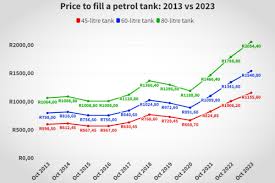Introduction
Fuel prices in South Africa have always been a crucial issue as they directly affect the cost of living and economic stability. In October 2023, the nation’s fuel prices have seen significant changes, resulting in widespread concerns regarding inflation and consumer spending. Understanding these changes is essential for residents and businesses alike, as they navigate the impact of rising operational costs.
Current Fuel Price Overview
As of October 2023, the Department of Mineral Resources and Energy announced that fuel prices are set to increase. According to their latest fuel price adjustments, the price of 93 octane petrol will rise by R1.20 to R23.00 per litre, while 95 octane petrol will increase by R1.30, reaching R23.50 per litre. Diesel prices have also been affected, with increases of up to R1.70 per litre, translating to R21.00 for 0.05% sulphur diesel.
Factors Contributing to Price Increases
Several factors play into the rising fuel prices in South Africa this month. Firstly, a surge in global oil prices has been influenced by geopolitical tensions and OPEC’s production cuts. The rand’s depreciation against the US dollar has compounded these effects, making fuel imports even more expensive. Furthermore, the ongoing energy crisis and increased demand from recovering economies globally have added upward pressure on fuel costs.
Impact on Consumers and the Economy
The rise in fuel prices poses several challenges for South African consumers. Increased transport costs could lead to higher prices for food and goods, further straining household budgets already affected by past increases in inflation. The knock-on effects may also impact small businesses that rely on fuel for delivery and logistics, potentially stunting economic growth.
Conclusion
As South Africans brace for a notably higher cost of living due to October’s fuel price increases, it is critical for consumers to remain informed and adapt to these changes. While the government and industry stakeholders are expected to monitor the situation closely, consumers and businesses alike are urged to explore energy-efficient alternatives and consider budget adjustments to mitigate the financial impact. Looking ahead, analysts predict that if global oil prices remain volatile and the rand continues to weaken, further fuel price adjustments may be unavoidable in the coming months, making awareness and proactive planning essential in navigating these economic challenges.


